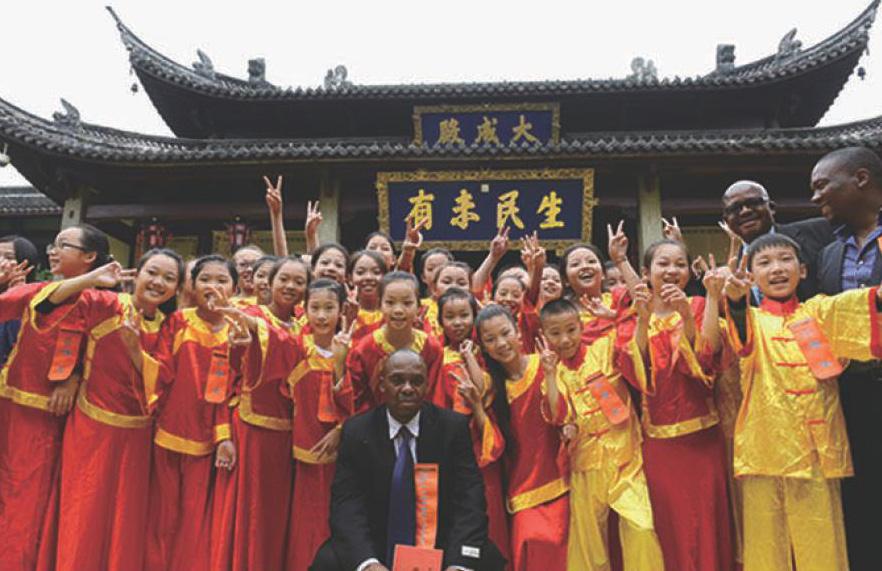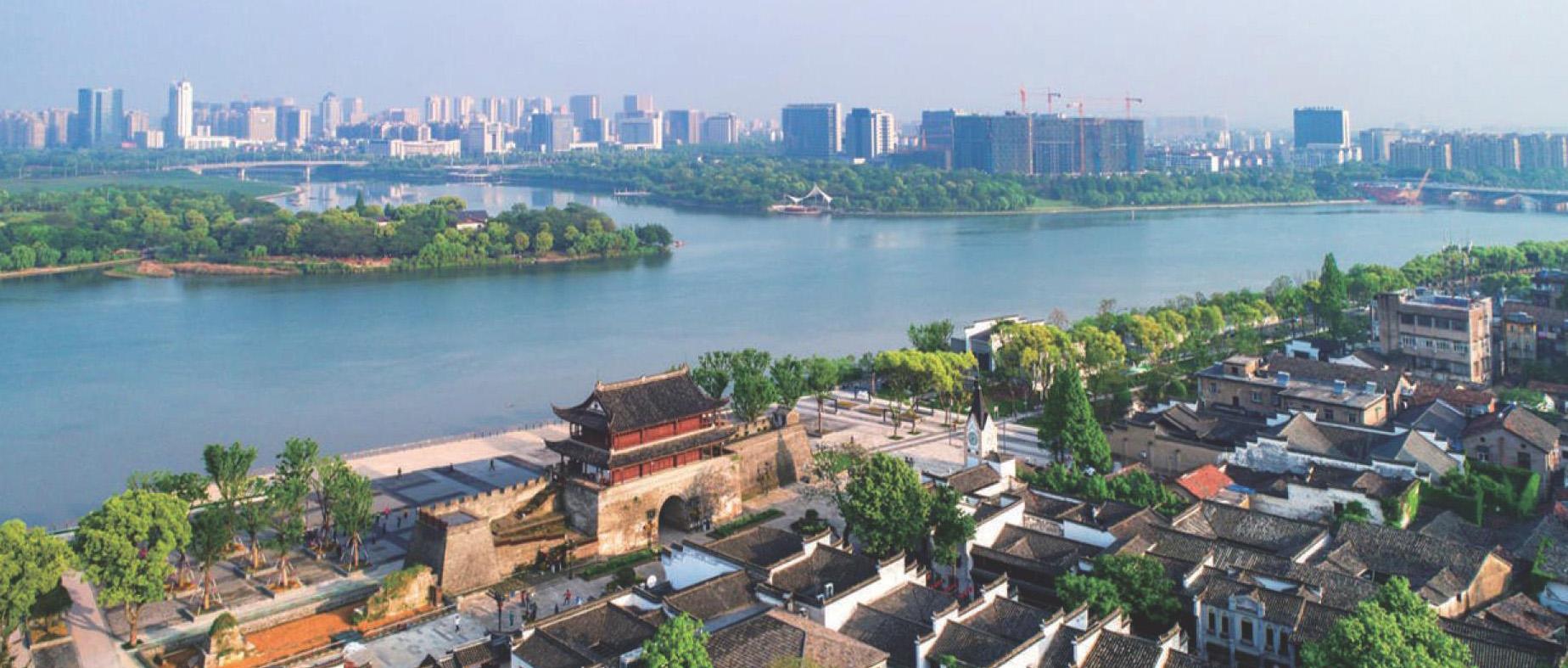“南孔圣地 衢州有礼”的人文内涵
单长涛



君子最早见于我国古老经典,后经孔子改造与设计、孔子后学的充实而成为象征仁礼兼备、修己安人、“慎独”而“中庸”、厚德载物的理想人格,深刻塑造了中华民族的精神。南宋以后,孔氏后人南迁入衢,形成了以衢州孔氏家庙为物化象征、以儒家思想为核心的孔氏南宗文化,君子思想由此在三衢大地生根发芽,为当地礼仪人文教化作出了不可磨灭的贡献,推进了衢州的“人文有礼”,是今天“衢州有礼”的思想活水。
衢州君子之风渐成
衢州“居浙右之上游,控鄱阳之肘腋,制闽越之喉吭,通宣歙之声势”,川陆所会,四省通衢,特殊的地理位置,南孔未扎根以前的衢州民风素来尚武、好义、彪悍,这种民风类似于孔子所讲的“好勇不好学,其蔽也乱”,需要“学礼”做君子以完善。
南孔落户衢州确确实实发挥了这种作用,孔氏后人以衍圣弘道为己任,入仕则行仁义之政,居乡则教化一方。光绪《常山县志》卷五十九《寓贤》记载:“孔诏,……任衢州西安县管民长官。介然自守,以礼义化俗,未尝怒加一人。” 孔诏之子孔灏等人进一步发扬了“介然自守,以礼义化民”的修己安人的君子精神,世人赞道:“自圣人至君,五十有三世矣,而君之兄弟皆彬彬有学,食禄于时,以世其家,所谓圣人之泽虽万世犹未艾者也。”像孔诏父子一样的孔子南宗后人几乎代有人出,不胜枚举,他们在其位谋其政,衍圣弘道。入仕者在衍圣弘道,居乡者亦在教化百姓。“孔洙让爵”前,孔子五十世孙孔元龙年逾九十,仍然在柯山书院著书立说,教书育人。“孔洙让爵”后,平民化南宗后人更加自觉融入江南社会,乐善好施,推进了当地的人文教化,如孔子第六十五世孫孔衍鸾因“忠义之念甚笃”而影响乡里;第六十七世孙孔毓天“以敦伦饬纪、乐善好施为念”而为人所推崇,为“士修礼义,俗尚敦朴”的社会风气的形成作出积极的贡献。
经一代又一代的孔氏南宗人“铭先祖教诲,矢志于衍圣弘道,未敢稍有懈怠”的作为,在儒家文化浸润下,衢州的社会风气终有质的完善。孔子后人“南渡而后,蔚为大宗,历二十余世足为乡邦弁冕” ,受此教化,“三衢人士德日崇,业日广,以伦理为镃基,以廉节为砥柱,以诗书为户牖,以政教礼乐为丹雘,穷则追箪瓢沂浴之风,达则树伊周吕召之业”,衢州“世风益竞,名巨迭出。至今敦行古道,雅尚礼文。君子重廉耻、惜名节,小民畏刑宪、寡词讼。居市井者文而浮,处乡都者质而鄙。” “悍而果”的衢州也由此大变为好学知礼的君子衢州。
衢州的“博文约礼”
书院作为古代中国乃至东亚一种较为特殊的教育载体,是以私人为主体、间有官府兴办的聚徒讲授、研究学问的场所。它雏形于东汉,发轫于唐代,发展于北宋,繁荣于南宋,衰落于明清。在书院的发展史上,南宋书院的发展呈井喷之势,按照邓洪波的统计,南宋书院总数为442所,是北宋的6倍,是唐至北宋500年间总书院143所的3倍 。南宋时,从地域上来看,前三名的分布是:江西147所、浙江82所、福建57所 ,三地的书院几乎占据了南宋总书院的三分之二,出现这种地域上的盛况,除了朱熹、陆九渊等人的努力外,与孔氏南宗文化落根于三地的接壤地衢州亦有莫大关系 。而当时的衢州在书院发展方面亦是预料中的兴盛,参照吴万居、傅春龄、崔铭先等人的研究成果,在南宋时衢州的书院多达20所,其中的柯山书院、清献书院更是在全国负有盛名。 衢州书院的兴盛一直延续到了明清。按照刘国庆的研究,至明清时期衢州书院依旧繁荣,当时的书院已达30多所,主要有清献书院、衢麓讲舍、正谊书院、鹿鸣书院、清漾书院、凤梧书院、定阳书院、崇化书院、逢辰书院等。
在整个衢州书院史上最为著名的当属柯山书院(前身为梅岩讲舍),通过它可窥衢州书院盛景。柯山书院由毛幵创建于两宋之交,创成之初,朱熹等人便常来此讲学,促进了柯山书院的大盛。其后大儒徐霖在此“研精六经之奥,探赜先儒心传之要”,“四方之士前来听讲者达三千多人” ;孔子五十世孙孔元龙著《诲忠策》《柯山论语讲义》教诲学子,其“卒之日,弟子临哭者三百人” ;马端临寓著于教,完成“治国安民,济世之儒的有用之学”的《文献通考》。……基于柯山书院,可以看出,当时衢州书院中教授德艺双馨,所教内容为儒家修德阳性之学,学众之多且虔心问学、尊师重教。因此,以柯山书院为代表的衢州书院事业,对衢州所产生的作用是显而易见的。与着眼于选拔官僚的官学不同,这些书院注重人格教育、修身之道,教人做君子。衢州书院培养了一批又一批深谙儒家思想文化的人才,据有关史料统计,自南宋至清,衢州籍中进士科举者多达1013名(含状元3名),有力地推进了衢州人士修身齐家治国平天下的君子理想的实现。
在历史上曾空前繁盛的衢州书院在近代也走向了衰落。1901年,清政府令书院改学堂,从此传统书院成为历史,这不能不让人扼腕叹息,正如胡适所言:“书院之废,实在是吾中国一大不幸事。一千年来学者自动的研究精神,将不复现于今日。” 但进入二十一世纪又出现了让我们欣慰的画面,传统的书院虽然没有了,但一些具有传统书院读经、藏书、会讲功能的机构渐渐兴起。
君子精神润衢州
在孔子思想中,孝为仁之本、礼之始,是君子最为重要的内在品质。孔氏南渡儒家思想扎根衢州之后,孝文化得到弘扬。这突出的事件即是衍圣公孔文远为周雄立周宣灵王庙。周雄,杭州新城(富阳)县人,生于南宋淳熙十五年(公元1188年)。年少时随父来衢,与孔子第五十一世孙、衍圣公孔文远同窗读书,私交甚好。周雄二十四岁时,其母病重,他到婺源五王庙为母祈福,归衢,闻母讣,痛哭哀伤死于船中。孔文远感其纯孝,捐出住宅,为周雄塑像立庙以祀。
衍圣公立周宣灵王庙是对行孝之人的最高褒奖,体现了孔氏南宗后人对孝的重视。此后,孔子南宗人将周宣灵王庙作为孝文化的重要载体,以教化人心,促使以“南孔”孝文化为中心的衢州地方文化的形成和发展,形成了“孝”的节日,如万田乡余家山头村每年正月十八的“女儿节”(浙江省非物质文化遗产),在这一天,女儿必须回娘家孝顺父母,到祠堂祭祖;衢江区云溪乡蒋村的重阳节尊老祭祖,老人一律款待的习俗延续至今等。由此可见,孝文化浸润着衢州,已成为衢州人思想不可割舍的部分,培养了一批又一批的孝子、孝女,如,明代的为探望病重继母千里迢迢回家而病逝的余敬、今天的“最美衢州人”孝心媳妇刘兴娥等。这些将孝作为立身之本的人,于古于今都是一个不折不扣的君子,他们的孝行促成了家庭和睦、邻里团结、社会和谐,诠释了君子衢州。
衢州的新君子
孔氏南宗的到来,推进了衢州儒学的兴盛,在明朝中后叶,南孔儒学已渗透到商业领域。这突出体现在徽商入衢与“龙游商帮”的形成。
徽商入衢。衢州接壤徽南,富产木材、茶叶等,从明朝开始,以“盐、茶、木、质铺(典当)为大宗”的徽商渐渐遍及衢州。久而久之,许多徽商便买田置地侨寓于衢。郑瀛《文公祠记》记载:“明天启七年,徽商诸先辈捐资鬻地,建祠于城之小东门朝京坊新安里,同事者十三姓,合业者二十九人。”这其中最为著名的代表是郑鹤旸。
郑鹤旸在衢州长期经营盐业,其人亦商亦儒、广交名流,撰有《榖似巵言》,深受当时明朝首辅叶向高的赞颂,叶亲自为郑撰写《新安里记》,高度赞扬郑鹤旸“孝友”“雅志经世”,郑著《榖似巵言》乃“博物善作”,其寓所新安里为“君子之兹里之创也”。 观《新安里记》,以郑鹤旸为代表的儒商以自己品性、儒雅博得社会上的认可,是儒化的徽商。如果说,徽商来衢州经商是因为衢州的物产,那么他们扎根衢州则源自对衢州人文的认同感。徽文化重礼义,崇儒学,徽商大多受徽文化的熏陶,在所到之地多乐善好施。而衢州是孔氏南宗的核心地,渊源同自的两大地域文化自然融合,这促使徽商入衢与本身的儒化。徽商入衢,对衢州深有影响,助推了衢州儒商的产生,这其中的卓越代表便是“龙游商帮”。
“龙游商帮”的形成。“龙游商帮”是以县名来命名的,但实指浙西地区衢州府西安、常山、开化、江山、金华汤溪等地的衢商集团,明万历年间,在与徽商、晋商以及江右帮商人在商場中角逐和学习中崭露头角。 龙游商帮在形成和发展的过程中均贯穿着君子精神。
龙游商帮成功的意义是双向的,于商人,他们以儒为锲,在商人的骨子里注入了君子的气质,改变时人对商人的传统认知;于君子,龙游商帮以切实行动证明了不仅在士农阶层能成为君子,在所谓的“四民之末”的商人阶层里也可以成为君子,这无疑是对中国传统君子文化的一个扩展。
虽然在清末由于小农经济的举国强势、陆路交通的开辟与水运交通的式微,尤其是太平军入浙等原因,龙游商帮走向隐没,但我们应该看到,它对商人的新界定,对君子的新解读,以及要经商先做人、用君子人格撑起经商之道的经商真谛影响深远,为之后浙商的兴盛与“坚忍不拔的创业精神、敢为人先的创新精神、兴业报国的担当精神、开放大气的合作精神、诚信守法的法治精神、追求卓越的奋斗精神”的浙商精神的形成做了源头之功。
君子气象绽放新衢州
2011年,衢州市委、市政府为贯彻党和国家的社会主义核心价值体系与道德文明建设,在衢州市范围内开展了“最美衢州人”的实践行动。“最美衢州人”一经提出,即在社会上引起共鸣,涌现了一批又一批的最美衢州人。如勇救落水少年而不幸牺牲的“最美爷爷”占祖亿,义务修路37载的“愚公”王嗣高、廖彩香夫妇,12年替子还债的诚信老爹黄茂盛,一肩扛起三个娘的孝顺媳妇张素梅,以及不让一个病人掉队的“移动结核门诊”团队等。太多太多的衢州人在默默无闻地践行着最美精神,他们使“最美”由“盆景”变“风景”。
“最美衢州人”所表现的是行动,所内化的则是大仁大爱、无私奉献的精神,这种精神正是传统君子精神在衢州的绽放,而这些“最美”的“衢州人”完全配得上君子的称号,由此使君子气象弥衢城。这正如前中共衢州市委书记陈新所言:“‘最美衢州人,美在朴实无华的善良,美在真挚无悔的奉献,美在勇于担当的奉献。他们……在关键时刻、危急关头,挺身而出、义无反顾,表现出了强烈的爱心和责任心,用凡人的善举生动地诠释了‘诚信、责任、仁爱、奉献的衢州人价值观,用无私大爱为这座城市增添了道德文明的光辉。”
综上所论,孔氏南宗落户衢州之后,孔子文化、儒家文化开始在衢州等地扎根,诗礼教化之风渐成,一批又一批的君子脱颖而出。儒风习习千年,崇德向善的君子精神、淳朴仁礼的人文之风已成为衢州的文化风尚。“南孔圣地,衢州有礼”正是对这一文化风尚的时代定义,是衢州历史、文化、时代的一个交汇点。
(作者系浙江大学古籍研究所在读博士后,本栏目图片由衢州市委宣传部提供)
A City Glorified by a Noble Heart
by Shan Changtao
The classic Chinese conception of “Junzi” (gentleman) was born well before Confucius, but was enriched by Confucius and his teachings into the ideal Chinese personality and quality—self-discipline, benevolence, and commitment. After the descendents of Confucius took Quzhou as their new home in the Southern Song era, Confucianism thrived and rose to be the most important contributor to the moral outlook of the locals, eventually becoming the ideological root of the city. The legacy of “Master Kong” permeates every cell of the city, forever inspiring its administrative strategy and social life.
Before the arrival of the Confucian culture in Quzhou, Quzhounese were known for their bellicose nature, partly because of the citys geographical location.
Confucius thought that rites, or rituals (li)—encompassing and expressing proper human conduct in all spheres of life—could steady a man as well as the society. This was also what his descendents preached in Quzhou. The result was the publics enlightenment that was never achieved before. The long list of outstanding educators and local officials includes Kong Zhao and his son Kong Hao. Kong Yuanlong, the 50th-generation descendant of Confucius, fulfilled his duties at the Keshan Academy well into his 90s. Role models from the Kong family also include Kong Yanluan, the 65th-generation descendant of Confucius, and Kong Yutian, the 67th-generation descendant, who won the locals hearts for his philanthropic deeds.
Confucius believed that education and reflection led to virtue, and that those who aspired to command others must cultivate discipline and moral authority in themselves. Confucius broke with tradition in his belief that all human beings could benefit from education. He espoused lifelong learning “for the sake of the self”, meaning self-knowledge and self-improvement.
“Shuyuan” (academy of classical learning) was once a special institution playing an important role in education in China and South east Asia. In China, its history dates back to the Han dynasty. “Shuyuan” reached its heyday in Southern Song, with the number six times more than in the Northern Song years. The number of “shuyuan” based in Quzhou topped 20, with Keshan and Qingxian enjoying a fine reputation in the country.
Originally called Meiyan Lecture Room and founded by Mao Jian at the dynastic turn of Northern Song and Southern Song, Keshan Academy is the most famous academy of classical learning in Quzhou. Zhu Xi (1130-1200), a great Confucian scholar, philosopher and educator, contributed to the fame of the academy by his frequent visits as a lecturer. In its heyday, the academy drew in as many as 3,000 disciples, and master scholars such as Xu Lin, Ma Duanlin, and Kong Yuanlong. Focusing on moral education, the academy produced a galaxy of men of erudition and vision. Statistics show Quzhou generated 1,013 “jinshi” (a successful candidate in the highest imperial examination in the old times of China) in the period from Southern Song to Qing.
Confucius was emboldened to think that he could set things right in the world. As stated in The Analects, Confucius believed that social harmony would naturally follow from the proper ordering of individuals in relation to one another, with the family unit as the basic building block of society. He therefore stressed the cultivation of personal qualities such as benevolence, reciprocity, and filial piety as essential to the formation of well-educated, conscientious individuals who would benefit society through public service.
Located in Kecheng, Quzhou, Zhou Xiongs Temple was first built in the Southern Song Dynasty in memory of Zhou Xiong for the mans filial piety. Legend has it that Zhou Xiong is the incarnation of the God of wind and rain. Zhou Xiong died at the age of only 24 because he prayed for a shorter life of his own so that his mother could have a longer one.
Filial piety is an important part of the subconsciousness of people in Quzhou. The city has produced a good many filial models such as Yu Jing in the Ming times and Liu Xinge in modern days. Behind the social harmony of Quzhou is the filial awareness of Quzhounese passed down from Confucius and his followers.
The essence of Confucianism not only became the cultural spine of Quzhou. It also penetrates into other dimensions of the citys social and business life, as noticeably shown by the citys connection with the businesspeople from Anhui.
Quzhou borders southern Anhui province, where shrewd businesspeople thrived on tea, salt and other specialties of Quzhou and eventually settled down in Quzhou. Zheng Heyang was a perfect illustration of the community that is reputed as the “Confucian businessmen”. The salt dealer from Anhui became a celebrity in Quzhou not only for his success in the salt business but also for his learned and refined charisma. Zheng Heyang was just one of the many Anhui businessmen choosing to make Quzhou their home not just for entrepreneurial purposes. They chose to stay because of the local social habits and culture they easily identified with.
Indeed, the teaching of Confucius is a thread running through the history of Quzhou business community, collectively known as the “Longyou businessmen”, who cut a figure in the Wanli years of the Ming dynasty by outsmarting their counterparts from Anhui and Shanxi. In Quzhou, gentlemen and businessmen are two in one, which is a subversion of the stereotypical definition of “businessman”. The good days of “Longyou businessmen” have long gone, but the perception drawn from its Confucian source has far-reaching implications.
In 2011, the local government launched the “Beautiful Quzhounese” campaign to celebrate the power of ethics in modern social undertakings and encourage the locals to contribute to the citys moral construction.
“Beautiful Quzhounese” is essentially about taking actions, as has been proved by the kindness, integrity, and responsibility of all people who call Quzhou their home and have proven how a city can be glorified by a noble heart.
After settling down in its adopted home in Quzhou, Confucian culture blossomed in the new soil into a splendid flower that nurtured generations of men of noble character in the following millennia and a unique cultural character was fostered in Quzhou in the process. Today, the citys devotion to preserving and propagating Confucius precepts is breathing new blood into the teachings at a crucial time of social and cultural transformation.

